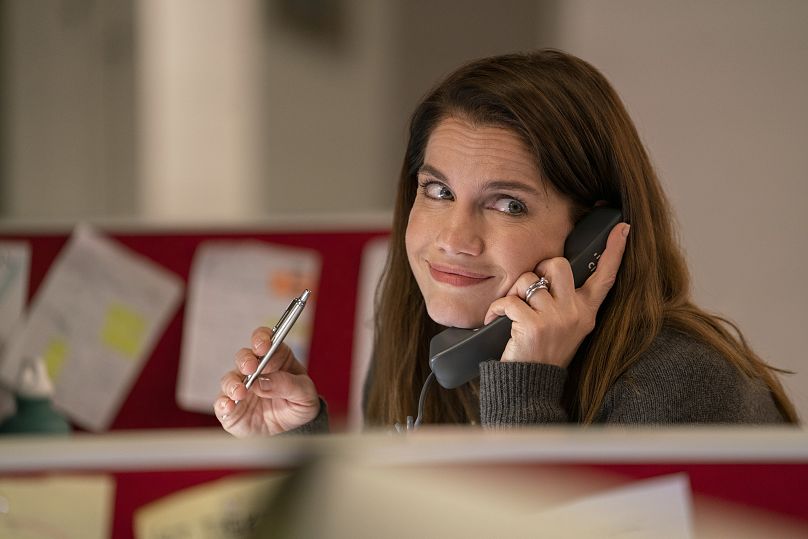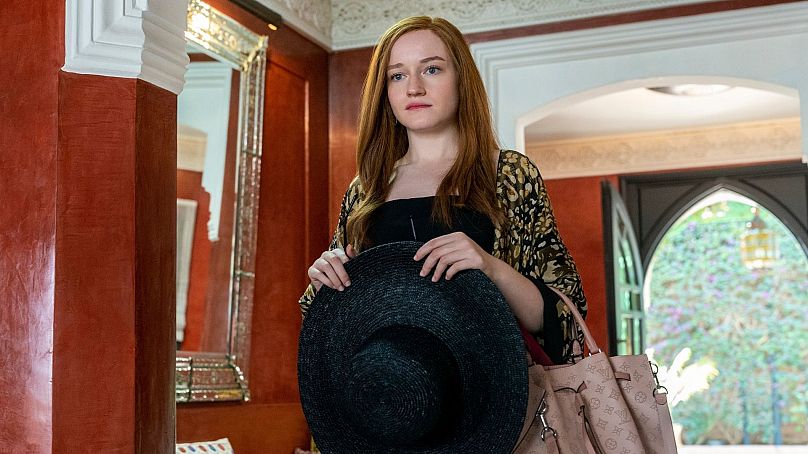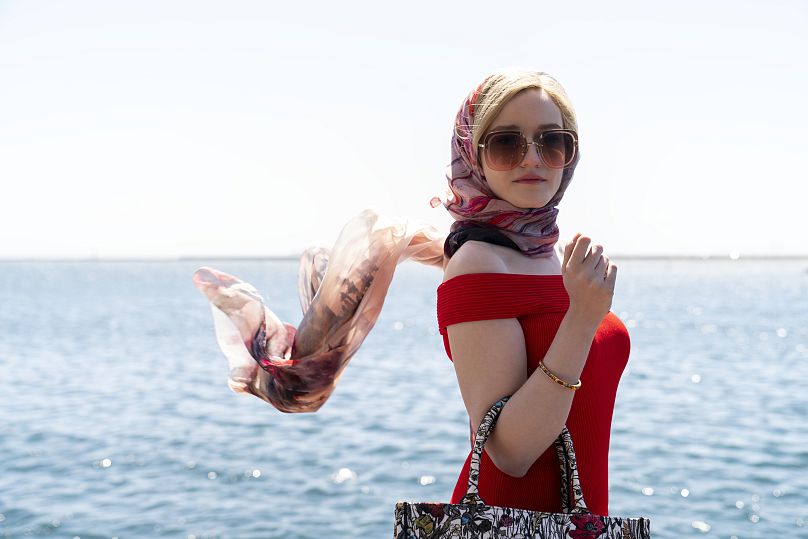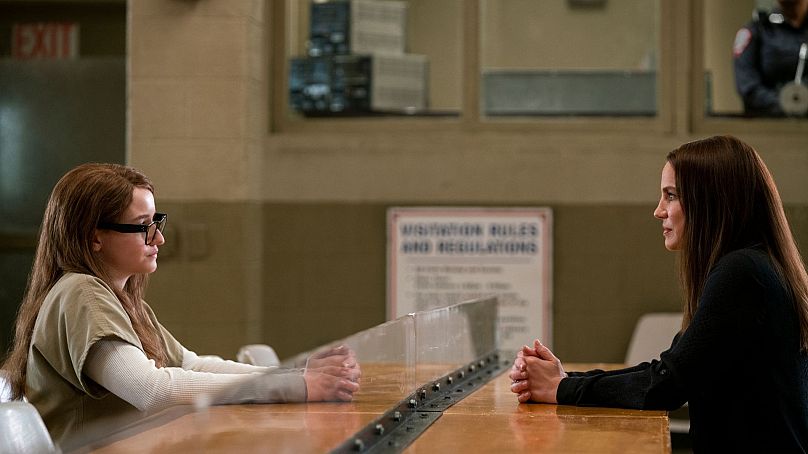The Shonda Rhimes-produced Netflix hit is making headlines for its punchy, powerful drama surrounding socialite con artist Anna Sorokin's fall from grace.
Netflix's latest drama series Inventing Anna dropped on 11 February and has dominated the top spot ever since.
 ADVERTISEMENT
ADVERTISEMENT
 ADVERTISEMENT
ADVERTISEMENT
A creation of beloved television connoisseur Shonda Rhimes (Greys Anatomy, Scandal, Bridgerton), Inventing Anna brings the borderline-mythical tale of Anna Delvey's life to our screens once and for all.
The show chronicles the very-real descent of Anna (real name Anna Sorokin), a 31-year-old Russian woman posing as a German heiress as she scams her way around Manhattan's elite parties, hotels, and restaurants for years on end.
Amid the excitement, Rhimes' part-fact, part-fiction approach to unmasking the con artist has left people with some serious questions on what to believe.
“This whole story is completely true. Except for the parts that are completely made up," viewers are warned.
Here are the biggest truths and lies told throughout this whirlwind.
Beware – there are huge spoilers ahead.
REAL: The New York Magazine article that inspired it all
The show has received praise for looking at the multiple dimensions of Anna Delvey's world.
While it would have been easy to just produce a bolshy play-by-play of her fake wealth unravelling, Inventing Anna intertwines itself with a journalism investigation that is just as important as the scandal itself.
Without it, we wouldn't know who she is.
It's important to note, because Inventing Anna came from a real long-haul written investigation. This show would not exist without the work of Jessica Pressler, journalist and contributing editor at 'New York Magazine'.
Her feature, 'Maybe She Had So Much Money She Just Lost Track of It', published in 2018, simmered among the magazine's core readership before exploding onto the internet shortly afterwards.
Thousands of readers grew hooked on every word. Jessica's storytelling spanned 8,000 words in size and the scope of the narrative felt gigantic.
At the centre of this show honouring Jessica's work is Vivian Kent, played by Anna Chlumsky, who works for the fictional 'Manhattan' magazine and is set on obtaining as much information from Anna's friends, acquaintances, and the subject herself.
Like Jessica, Vivian is portrayed as working tirelessly to get to the bottom of Anna's strange existence.
The article's success triggered a ripple effect of subsequent write-ups, Twitter trends, and a merry band of production companies with an interest in taking the story to new heights. Enter: Netflix and Shondaland.
FAKE: Bosses at the magazine were apprehensive to publish the exposé
One of the subplots threaded throughout the series suggests Vivian AKA Jessica's editors weren't fully supportive of commissioning her piece. Her two male seniors at the fictionalised 'Manhattan' magazine give the impression they'd much rather her energy was placed elsewhere.
So much so, she is initially given just two weeks to get the job done.
Pressler's actual experience pitching the story was a lot smoother than that, telling New York Magazine her real-life bosses attitudes were "quite the opposite".
“I think the show bosses are a stand-in for patriarchal offices in general,” she explained.
She did concede that most editors would perhaps have some questions for a reporter wanting to write a 8,000 word feature on a person nobody had heard of.
REAL: Anna Delvey went to extreme lengths to scam hundreds
In 2017, Delvey was arrested after allegedly defrauding banks, hotels, and acquaintances of a total of $275,000 (€242,000). Inventing Anna depicts the work at the core of her elaborate methods with accuracy.
One of the more bemusing aspects of both the article and the series is Anna's ability to hop from one luxury hotel to another for free.
Her facade was simple: long-term stays in each apartment for unspecified periods made it easier to leave payment until checkout, and staff never had any questions about her finances, or lack thereof, because of her penchant for generous cash tips.
Anna's flurry of excuses ranged from failed wire transfers and tech problems to broken credit cards.
In episode four, Delvey business aspirations leave her so set maintaining a facade of wealth she invents Peter Hennecke, a fictional German financier in charge of her non-existent trust fund worth tens of millions.
Aspects of this creation are embellished – the show depicts Anna going to great lengths to pose as Hennecke, buying a separate phone on a European contract and using voice disguising software to conduct phone calls as him.
In reality, Anna did create Peter. For a while he was used as means of fielding financial queries from people that were owed money from her.
But these pursuits were mostly done by email. When emails began to bounce from Hennecke's account, Anna was around to tell people "he" had unfortunately passed.
FAKE: The feature was not written to save the journalist's career
Another bit of dramatic license linked to Pressler's career was her supposed "fall from grace" as an investigative reporter.
Early on, the show establishes that Vivian lost a crucial job opportunity in 2014 as a result of publishing a fraud story that ended up coming from a bogus source.
“Google never forgets,” she tells her husband, certain that no publications will be interested in hiring her.
While the bogus story did happen, and landed her in lukewarm water, the damage was only short-term. Pressler's career wasn't on tenterhooks in the way her fictional counterpart's appears to be.
Inventing Anna suggests this new lead is all the more crucial because it represents a redemption opportunity for the journalist, but Pressler didn't need one.
A year after the mishap she would publish the story that provided the basis for 2019's 'Hustlers', a gigantic critical and commercial success.
The film, which explores a group of strippers scamming their wealthy clients in the wake of the financial crisis, was fronted by J-Lo, and also the place the journalist was first fictionalised – by Julies Stiles, no less. Will Ferrell is said to have picked up the rights to the story within months.
REAL: A shambolic Moroccan holiday where everything fell apart
If you followed the real Anna Delvey story back when New York Mag's story was first published, you'll probably be familiar with the name Rachel DeLoache Williams.
We're first introduced to the fictional Rachel as an audience in episode six as Anna's former best friend.
The pair first met in 2016 on the Manhattan party scene and became close shortly afterwards, spending virtually every day together.
Rachel becomes the first person to highlight Anna's scammy behaviours to the authorities, clear in the conviction she is a professional con artist. The details of what happens next are honoured accurately in a handy pairing of decadence and betrayal.
A first-person piece printed in Vanity Fair by Rachel describes a trip the two friends accompanied by personal trainer and celebrity fitness guru Kacy Duke (played by the wonderful Laverne Cox), take to Morocco, a suggestion of Anna's that she insists she'll pay for.
It's here that the lines between Anna's feigned reality and her actual financial situation blur thick and fast.
"She reserved a $7,000/night private riad, a traditional Moroccan villa with an interior courtyard, three bedrooms, and a pool, and forwarded me the confirmation e-mail. Due to a seemingly minor snafu, I’d put the plane tickets on my American Express card, with Anna promising to reimburse me promptly," Rachel wrote.
"Since I did this all the time for work, I didn’t give it a second thought."
The venn diagram of ways the trip got dismantled in this dramatisation and in real-life is, virtually, a circle.
Trouble starts when Kacy heads home early from Marrakesh due to illness – something that really did happen. Soon after Anna's card gets declined at the butler-assisted accommodation's reception due to a "banking problem", meaning Rachel went on to pay for the trip's lavish dinners, Moroccan gowns "gifted" from Anna, and everything else that followed.
Later, she faces pressure from both hotel staff and her best friend to foot the bill as a temporary measure.
The total amount came to $62,000 – paltry in comparison to Anna's alleged net worth, but the entire annual salary at her best friend's job working at Vanity Fair as a photojournalist.
An uphill battle ensued to even get Anna to acknowledge the debt needed repaying.
"She spun a web of promises that grew increasingly self-referential and complex. I thought there was an issue with her trust-fund disbursement, and I resented her unwillingness to be straight with me," the article continues.
"The next day, I e-mailed the New York County District Attorney’s Office, linking to an article about Anna: “I think this girl is a con artist."
"An hour later, my cell phone rang. The caller I.D. read 'United States.' I picked up the phone, as I stepped away from my desk. 'We think you’re right,' a voice said."
FAKE: The demonisation of Rachel
Some critics argue that the series is too sympathetic to the plight of its beguiling protagonist.
Inventing Anna and its search to find a "real" villain unjustifiably leans on the aforementioned Rachel.
The positioning of Team Anna vs. Team Rachel harkens back to the high-camp dramatisations of some great friends-to-enemies arcs: Gossip Girl's Serena vs. Blair, or Paris vs. Nicole. A constant stream of people being used for their assets until they are no longer valuable. But who is using who?
This conflict comes to a head in the show's final episode, Anna's trial, in which all of the key legal components are upheld by the show's plot.
Succession's Arian Moayed plays Todd Spodek, Anna's small-fry lawyer of the same name. He goes hard on Rachel in his cross-examination, shifting the focus to the monetary gains made by her throughout the end of their friendship.
Spodek highlights a $300,000 book deal for the bestseller 'My Friend Anna', her payment of over $1,000 for her Vanity Fair article, $35,000 from HBO for the rights to her side of the story (coming soon and written by Lena Dunham) as ways she profited from her friendship with his client well beyond the money she was owed.
As a viewer, you know when you're being positioned to dislike a character. Nevertheless, Rachel bore some serious brunt in the hellfire that was Anna's transition from great pretender circus clown,
Sure, Anna's fake millions would be useful to play with. One of these people is a professional con artist, and the other has to reckon with a friendship built on lies.
BONUS FAKE: Nobody broke into Anna's family home
The end of Inventing Anna sees Vivian struggling to separate herself from the subject she has studied for all of this time. In our world, they still speak every so often to this day.
Listless, she takes herself to Anna's home country of Germany following her article's publication for some well-needed closure. She hopes to find Anna's distant parents and understand why she became the way she did.
Her desire to reach this understanding hits a serious peak, resulting in her breaking into Anna's family home.
"I definitely did not try to break into anyone’s home," confirms Jessica.
"I did go to Germany though. I was hearing so many different stories about Anna, and it kept growing, and there were a lot of conspiracy theories going on, and I started to have so much material, I thought I would do a book of some kind. So I went, but it was not quite like that. There was a lot more laughing."














